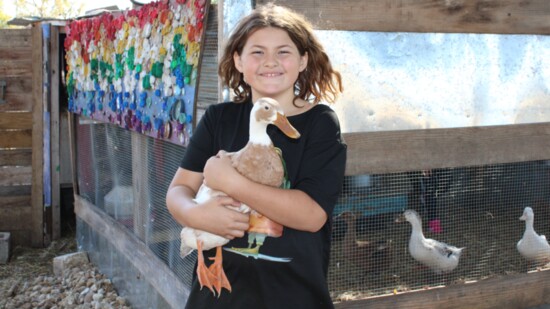Austin Discovery School has been on a mission to foster a generation of empathetic young people through an eco-wellness and social and emotional learning curriculum.
That’s a stark change from when the East Austin grounds were home to the State School Farm Colony, which opened in 1933 as the all-male offshoot program of the co-ed Austin State School.
"The juxtaposition of these polar opposite facilities is a testament to how our community is embracing a social skill curriculum that allows children to step into their own power," said Kelly McRee, who co-founded Austin Discovery School and serves as director of the social and emotional learning program.
Once a farm colony
The colony intended to provide a home for boys with intellectual disabilities who could not further benefit from training at the Austin State School but could do work, such as farming and gardening, according to the Texas State Historical Association.
However, many of its residents were juvenile offenders sent by court order as an alternative to detention. The campus expanded from a single building to 68 structures across 436 acres, featuring a swimming pool, cannery and cemetery. At its peak, the school housed 1,800 residents, some of whom are buried on the grounds.
Mental health care reforms in the 1960s ended farming activities at the facility, which was then renamed Travis State School to reflect the shift. A lawsuit claimed Texas schools of this type violated residents' constitutional rights and offered inadequate living conditions. After a 1987 settlement, Travis State School began transitioning from institutionalization to integrated community placement before closing in the late 1990s.
The grounds fell into disrepair, reflective of a bygone era of antiquated mental health care within an educational environment.
A new approach to education
Although the former name included the word "school," its approach to education differed significantly from the curriculum at Austin Discovery School. With an emphasis on eco-wellness and social and emotional learning, the charter school is committed to a restorative approach to education.
"The program helps students develop skills to recognize and manage emotions, set goals and make responsible decisions,” McRee said. Social and emotional learning “teaches students to communicate effectively and work through problems constructively."
Students who participate in such programs demonstrate increased academic achievement, social awareness and higher emotional intelligence while experiencing less anxiety, depression and suicidal thoughts, according to the Yale School of Medicine.
"Bullying in a school setting has become a hot topic recently,” McRee said. “What stops this kind of behavior is fostering connections and relationships. We don't ignore the issue, but we make every attempt to figure out its root cause. We want our students to advocate for themselves, so we teach them the tools to do that. Not every student is going to get along, but we want them to learn mutual respect and how to interact despite those differences."
Dotting the grounds are chicken coops, bee habitats, brightly painted classrooms and gardens. These hands-on activities teach students lessons through real-life applications, drawing from other curricula like Montessori and Waldorf programs.
During a recent visit, students and their families participated in a garden clean-up day.
“My son is a kiddo who wouldn’t do well in a standard public school classroom when he was younger,” said Kirsten Edwards, a parent of two current students and one graduate. “He needed an environment that was more accepting of his neurodivergence, and the staff was willing to meet him where he was.”
The school offers a four-day week, flexible seating, hands-on learning and interactive playtime. Like any other public school, the students are also taught reading, math, social studies and science.
The future of education
Outdated methods of education often harmed students. These institutions focused primarily on control and containment, with minimal emphasis on personalized learning or social development, according to the Texas State Historical Society. Educational programs were typically rigid, isolating students from social interaction and reinforcing a sense of institutionalization, which limited their ability to build life skills or foster emotional growth.
However, Austin Discovery School is striving to build a think tank for progressive curriculum, McRee said.
By having psychology students from Texas State University observe the school’s advanced use of social and emotional learning, the hope is that the college students will incorporate that knowledge into their own practice upon graduating.
"We've even had some interns change their majors from psychology to education after witnessing how impactful this approach is,” McRee said. “What they've seen here has excited them and taught them they can still utilize their psychology knowledge but in an educational setting. By removing the robotic approach to education, Austin Discovery School allows students to learn in a safe space where they can articulate their needs and have not only their educational but also their emotional needs met.”
"The program helps students develop skills to recognize and manage emotions, set goals and make responsible decisions."
"By removing the robotic approach to education, Austin Discovery School allows students to learn in a safe space where they can articulate their needs and have not only their educational but also their emotional needs met."
